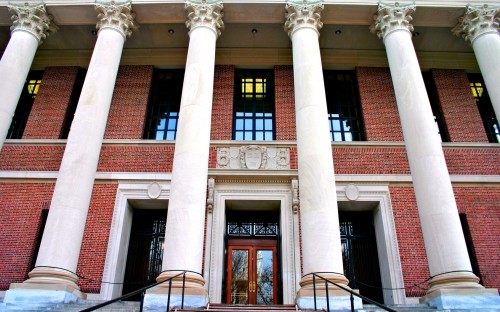There were few surprises when the latest of the 2014 full-time global MBA Rankings were released this morning - although there is encouraging news on graduate pay world-wide.
North American business schools continued their dominance, with four out of five of the top spots going to US-based universities in the Financial Times' Global MBA Ranking 2014. London Business School (LBS) was the only non-US school ranked in the top-five world-wide, leapfrogging Wharton to third-place.
Spain's IESE Business School and INSEAD also made it into the top-ten, in 7th and 5th place respectively - the only other European schools to do so.
Harvard Business School is ranked first again, for the fifth time since 1999, confirming its place as a world-leader in business education. Stanford Graduate School of Business remained second, with Columbia Business School and INSEAD ranked joint fifth.
HKUST Business School is the top Asian school, ranked 14, with China Europe International Business School considered second by the FT, ranked 17th. Nanyang Business School is ranked second in Singapore and 38th world-wide - excluding INSEAD which is considered in the rankings as split French-Singaporean.
The Australian Graduate School of Management (AGSM) is the top Australian school, ranked 62 globally.
Although US schools came up trumps there is encouraging news for UK-based schools, many of which made it into the top-50, including; Cass Business School (41); Manchester Business School (43); Cranfield School of Management (46); and Imperial College Business School (49), among others.
Lancaster University Management School and the University of Bath School of Management are also featured in the FT's top-100 list.
The ranking is based on surveys of business schools and alumni who graduated in 2010. The methodology is based on salary earnings, career progress, alumni recommendations and faculty, among other factors.
LBS is one of the most notable climbers and has seen a rise in MBA employment. 95 per cent of alumni are now in employment within three months of graduation. It is also ranked top for alumni recommendation, and has seen a rise in diversity.
LBS MBAs have highlighted the "instrumental network" that the school puts its students' in contact with. They also praise the support given to entrepreneurs, including their incubator and Entrepreneurship Summer School.
"I feel that is the most amazing part of LBS; how supportive the whole network is," said Elizabetta Camilleri, LBS graduate and founder of tech/fashion start-up SalesGossip.
Other noteworthy climbers include Yale School of Management, which rose four places to 10th for the first time in seven years, and the Kenan-Flagler school at the University of North Carolina, up 12 places to 32nd.
Location is increasingly important when it comes to applying to b-school, and Boston is now considered the "educational capital of the world", according to the FT, with six of the top 100 schools located in the state - Harvard, MIT: Sloan, Hult International Business School, Carroll school at Boston College, Olin school at Babson College and Boston University School of Management.
When it comes to employment, MBA salaries are also on the rise. Students who graduated in 2010 have seen salaries double during the past five years, according to the FT's rankings. This is encouraging news, at a time when MBA students who were surveyed still had the shadow of the economic crisis looming over them.
Over 90 per cent of alumni surveyed said they achieved pay rises. Alumni from Stanford averaged the highest annual salary over three years, an impressive $182,000, while Harvard MBAs banked a similar $176,000.
Many of these alumni have gone on to lead the world's top companies, as reported by BusinessBecause last week. Nearly one in three chief executives at leading corporations began with an MBA degree.
Some MBAs from these top-ranking schools are paying a premium for their salary increase, however; fees at 24 of the 100 ranked university's are $100,000 or more - excluding living costs and time out of industry.
There is further good news for those seeking careers in China. There has been a surge in demand for Asian business schools, and alumni from the region have seen higher salary rises than those in Europe and the US.
Alumni from four of the top-ranked Chinese MBA programs have enjoyed salary increases of up to 160 per cent between 2008 and 2013, according to the FT.
Nanyang alumni cited the economic strength in Asia as an increasing advantage in the MBA Jobs market. "Strong economic growth means there is an extremely strong entrepreneurial and enterprising spirit [in Singapore]. Because of the money, people are energetic, are happy to change the way they live and are open to new ideas," said Nanyang MBA Kabeer Chaudhary.
Respondents to the survey cited increasing earnings as their main motivation for beginning MBA programs. Developing management skills was second, with networking coming third.
85 per cent of alumni surveyed, who started an MBA five years ago, were at the time earning an annual salary of just $60,000. 49 per cent of full-time MBA students received a scholarship or sponsorship to help with tuition fees.
The FT surveyed 23,000 alumni from 153 business schools. More than 10,000 MBA graduates completed the survey, a response rate of 47 per cent.
To see the full 2014 rankings, visit: http://rankings.ft.com/businessschoolrankings/global-mba-ranking-2014
RECAPTHA :
4f
7d
5f
e8







